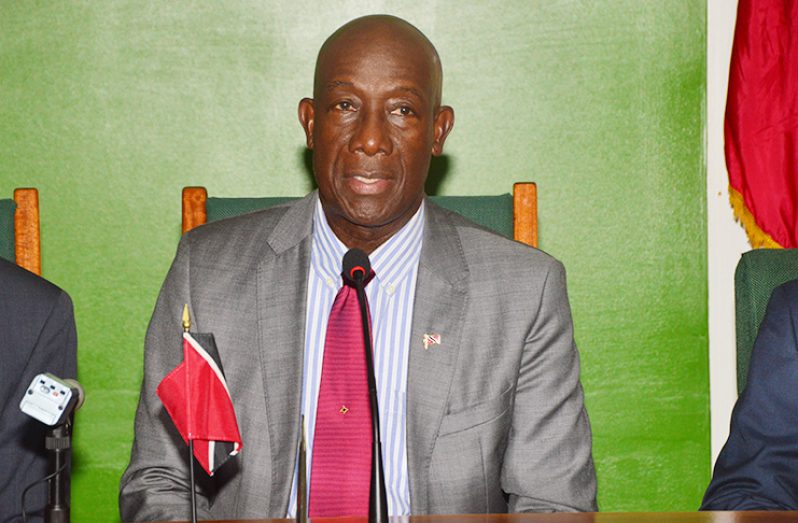– Prime Minister Dr Keith Rowley
TRINIDAD and Tobago Prime Minister Dr Keith Rowley has shared advice with Guyana on how the country can best negotiate oil contracts with multinationals, even as he acknowledged that some contracts are influenced by time, place and circumstances.
“We respect the sanctity of contracts while not accepting that contracts are written in stone. Contracts are engagements really between at least two parties or more and when we make contracts and if there is goodwill between the participants and if the intention is for both participants to benefit from the nature of the contract, we see the opportunity and the possibility of contracts being revisited, so as to maintain that balance of the elements of the contract and that is the basis on which we have approached the multinationals and we do so out of respect and we do so out of competence,” Prime Minister Rowley told reporters on Wednesday.
He was, at the time, visiting State House for the signing of a Memorandum of Understanding (MoU) on energy collaboration with Guyana.
Many critics of the oil contract signed between Guyana and ExxonMobil have complained bitterly and have questioned the benefits to be derived from the industry under the current construct.
The contract was first realised when Guyana in 1999, under governance of the late President Janet Jagan, originally negotiated and agreed upon a one per cent royalty.
When Guyana finally struck oil in 2015, the option to renegotiate the Petroleum Sharing Agreement (PSA) rose to the forefront of public interest.
In 2016, the APNU+AFC coalition entered into renegotiations with the oil company, resulting in a two per cent royalty, which will give Guyana $7B in annual revenues in addition to a 50 per cent share of profits.
However, many have still expressed their discontent with the new deal and Prime Minister Rowley in his comments on the matter spoke to how his country has been, and continues to form agreements at the negotiation table.
“Sometimes in negotiations you have to point out shortcomings on the part of that of others and we have no fear in raising voice on shortcomings on the part of others and they might point out shortcomings on your part. But we have no fear in raising our dissatisfaction with the performance of certain contracts,” he said.
The T&T leader added that his country has raised its own concerns in this regard, with the relevant parties and they are now at the negotiating table, having received the acknowledgement that their contract can be revised.
NOT EASY
However, he did take note that contracts are not always easily renegotiated as one would think as several aspects often come into consideration.
“I wouldn’t want to be the one to criticise what kinds of contracts you may have entered into, because contracts tend to reflect time and place and circumstances. But all I would say to Guyana is to understand where you’re at in the time and place and understand that you have a friend in Trinidad and Tobago,” he said.
He added: “I do know that given the fact that Trinidad and Tobago has been in this business for so long, and that we are engaged in very much of what you will be engaged in, whatever our experience has been, whether good, bad or indifferent, it would do Guyana well to know what that experience is, even if not taken as advice.”
However, the question was posed to the prime minister that his country is moving to close its oil refinery, Petrotrin, due to its current lack of financial value, and on that basis, why should Guyana heed the country’s advice on oil?
In a straightforward response, Dr Rowley remarked: “Let me make it very clear to anyone who is listening. Trinidad and Tobago is in no ‘state’. Trinidad and Tobago is a country that has done well for itself and we have done so largely on the back of the hydrocarbon business.”
VERY EXPERIENCED
He added that Trinidad and Tobago, although a small country on the market, is one of the oldest oil producers in the world with an accumulated 100 years of experience in the petroleum sector.
“The vision was to produce oil for the market and we became, over time, one of the major producers of refined products in the British Empire. Upon becoming a nation, we ended up owning the assets and some of the infrastructure. It did very well for us as the international market place allowed us to prosper,” he said.
Dr Rowley then added that it is the same hydrocarbon sector which allowed Trinidad and Tobago’s citizens to benefit from all-round improved sectors in the country and which is not now failing, but rather evolving to better than ever.
“If today, we’re having to treat with a piece of equipment, not the oil industry, the refining equipment in the industry, if today we have financial concerns about that and we take rectification, that puts us in no ‘state’, that puts us in a better condition to continue to prosper in the hydrocarbon sector… I would draw your attention to our current activities off our East Coast where we have at least four [drill ships] drilling in the deep waters and getting success and we’ve moved our interest in the hydrocarbon sector from oil onshore to oil onshore [sic] to gas offshore and to gas in the deep waters. So, we are now as engaged as ever or more so, in the hydrocarbon sector as we were 100 years ago.”
The prime minister and his team arrived in Guyana on Wednesday for a two-day trip, in which other areas for bilateral cooperation are expected to be up for discussion.




.png)









